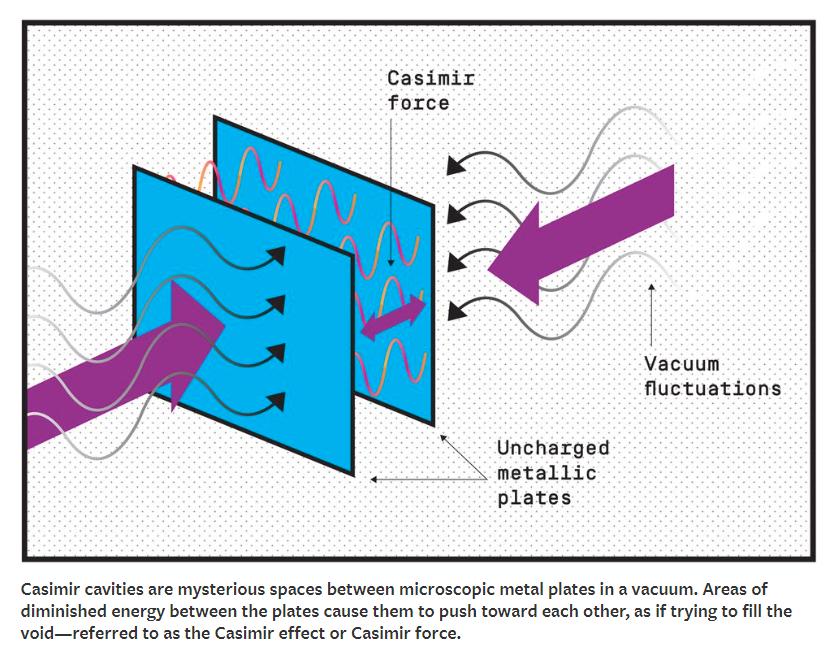Is it just me or does anyone else automatically dismiss articles where the caption ends in "and here's how!"
It's like articles that ask a question in the title...
I do not. They intrigue me.
Living long enough to realize light speed travel is possible 👍
Living long enough to realize just how slow light speed really is 😭
If it makes you feel any better, you won't notice the years pass by while you're travelling.
Just make sure to take your loved ones with you...
It really does have a tendency to slow things down...
not to be a party pooper, but as far as I know the casimir force is essentially the van der waals force. The way I understand it is that the vacuum energy method used to calculate the force on the plates is not correct, however it seems to be an approximation of the underlying driver of this effect which is the van der waals force.
Here is a publications in Physics letter that outlines the idea.
https://arxiv.org/abs/1605.04143
It's likely a light read for a physicist but a though one for a well read electrical engineer (me) but once again, I'm not a physicist so take it with a grain of salt.
It's a good primer for anyone who hasn't heard of Sonny White's work or the Alcubierre theory/drive. Currently the best option we have at the moment for making any progress beyond conventional action-reaction rocketry. Also very far away still. The biggest error is in the subtitle, claiming "reach the far ends of the cosmos in the blink of an eye". If it worked it would be magnitudes faster than anything Newton-related we can imagine, but it's still enormously slow compared to the size of even just our galaxy.
A great beautiful video short by the amazing Erik Wernquist (and narrated by the same Sonny White) called "Go Incredibly Fast" shows how big even "near" space is.
Another good example is in the game "Elite Dangerous" which uses the Alcubierre concept for its local space drives making travel within most systems reasonably fast. Even in the game use going from star to star they resort to a more instant "wormhole" technique as the warping effect would take too long to get anywhere in the galaxy.
But without some kind of loophole past Newton and Einstein, we're pretty much stuck in our own solar system, or to end up using generation ships that take hundreds or thousand of years to get anywhere.
I actually used Supercruise to go to another nearby star when I just started in Elite, but was disappointed to find out that the system doesn't load in unless you do an actual jump. Did find the 2001c maximum speed easter egg though, so that's cool
How long did it take? The system didn't load in because those wormhole animations are cleverly disguised loading screens.
It must have taken at least 45 minutes. I remember enjoying the 'realism' though and just left it going while I made a sandwich
It's behind a paywall. Does anyone have another link?
This is literally straight out of 3 Body Problem - book 3 iirc written like 10 years ago
Basically creating a low density area next to a high density area will cause the high density to rush to low density to fill the void, ya know, like wind.
He explains it better in 3body
And even at the speed of light, we would never reach "The end of the cosmos," because the universe is expanding at the speed of light.
Hense why as you go closer to the speed of light you experience time more slowly than an observer, because time is basically a by-product of this expansion. You would never even reach the next galaxy because we're moving away from each other at the speed of light.
Edit: At least not with this method. We would need a warp like in Event Horizon.
We would need a warp like in Event Horizon.
I'd prefer to avoid almost anything like in Event Horizon.
Why, are you that attached to your eyes?
Too bad Morpheus didn't have John Wick on that spaceship. We know they had a pencil, and John Wick could have taken care of business with a pencil.
Damn fine movie.
That doesn't sound right. That would mean that every year, every galaxy gets another light year further from earth. AFAIK the universe expands at different rates depending on distance from the observer.
"Light Speed Travel Is Possible" - of course it's possible, what speed does the headline writer think light travels at...?

Any chance you got an archive link for this? This sort of stuff is totally my jam even if it turns out to be some pop-sci shit written for clicks. I love anything that can be drawn on for speculative hard science fiction.
No paywallless link, but content blockers like ublock origin seem to have no issue whisking it away.
It seems far sillier for scientists to assign rules to the universe (e.g. "you cannot go faster than the speed of light")
We are but children grasping at straws... We know nothing of the entire universe. In fact, we have yet to fully explore this planet, and the many still-elusive mysteries that our bodies actually evolved to sense.
Imagine all the stuff we can't sense... The list may be endless.
Science
Subscribe to see new publications and popular science coverage of current research on your homepage
